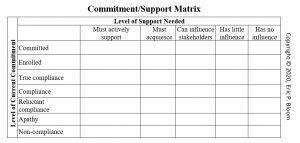Properly delegating to your peers has many professional advantages. It helps you complete needed tasks. It helps your manager’s team (you and your peers) work as a team for the greater good. Also, and potentially most important for your career, it places you in a leadership role among your peers because they are performing tasks based on your requests. This positions you for future promotions, and eventually, to be their manager, not just their peer.
When delegating to your peers, consider using the following influence techniques:
Influencer #1: Reciprocity
If you are willing to help your peers when they need assistance, they will be more likely to assist you when you need their help.
Influencer #2: Taking the high road
When trying to influence a peer to assist you in a project, rather than making it all about you, talk about it from the company’s, customer’s, or another’s perspective that will be of value, at least conceptually, for them also. It will be uncomfortable for them to say no to you if they feel your request is for the “greater good.” Then, when the task is completed, thanking those who helped you, thus allowing them to share in your victory, makes it more likely that they will help you again, especially if their association with your successful project is also of advantage to them professionally.
Influencer #3: Loyalty
If you are loyal to your peers when they need political, organizational, and/or budgetary assistance, they will be more likely to assist you when you need their help. Their help doesn’t need to be in kind, it could simply be providing you with a needed contact, offering you a resource from their department, or doing something helpful personally.
Influencer #4: Liking
If your peers like you, it is easier to influence them to do something on your behalf. You don’t have to be close friends or get together for lunch; you only need a comfortable business relationship and feelings of trust.
Influencer #5: Close relationship with your manager
One of the most reliable ways to gain influence over your peers is to be tightly aligned and close friends with your mutual boss. If your peers feel your manager is more likely to take your side than theirs, this gives you unstated delegated authority over others reporting to your manager.
Influencer #6: Cohen-Bradford currencies
As in all influence-based activities, try to gain an understanding of things that are important to your peers. It could be inclusion in your project, your friendship, visibility to senior management, or simply a thank you for their efforts on your behalf. Subtly providing what they want can help you get what you need.





